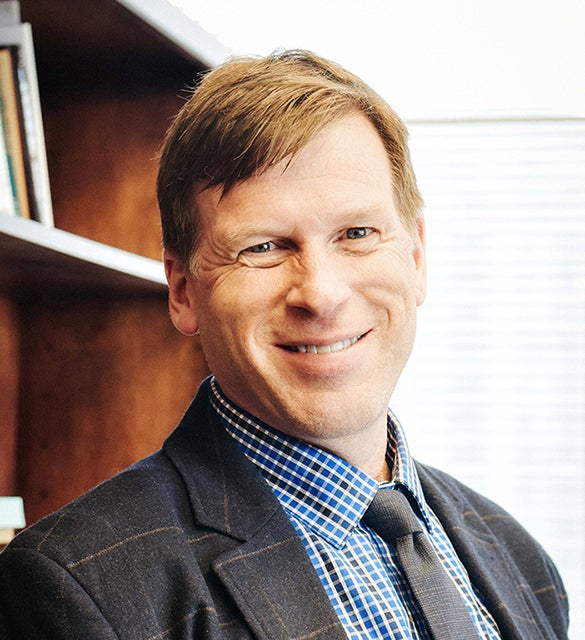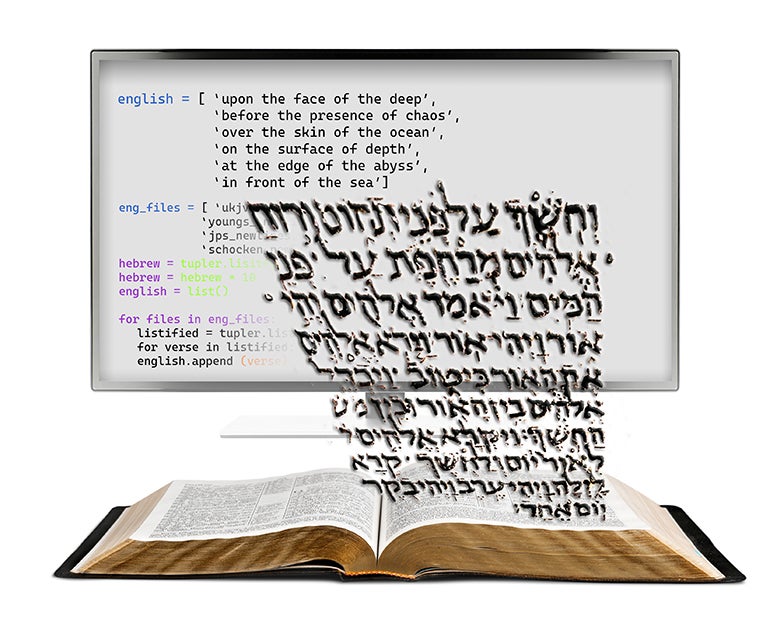lens
Experimenting with the Future
Introducing ‘h.lab,’ where the humanities and new tech converge
 Timothy Beal
Timothy Beal
Timothy Beal, PhD, is on a mission to help reinvent the humanities within higher education. As director of Case Western Reserve’s new h.lab, short for humanities lab, he aims to provide students and scholars computational tools, skills and a nimbler understanding of emerging technologies so their research can come alive in new ways.
For example, Beal—chair of the Department of Religious Studies and the Florence Harkness Professor of Religion—is working with colleagues to develop Face of the Deep, a project that will use machine learning techniques to explore different translations of Hebrew biblical texts.
In addition, just as h.lab is using technology to explore the humanities, it also is taking a humanistic approach to grapple with the impact of technology and what it means to be human in a rapidly changing world. While h.lab is in its infancy, it already has an interdisciplinary team of faculty involved. It's been supported by a 2020 grant from the university’s Think Big strategic planning initiative, spearheaded by Provost Ben Vinson III, PhD, and a College of Arts and Sciences initiative that elevates data science and machine learning across disciplines and was launched with funding from then-President Barbara R. Snyder. Beal recently spoke with Think about h.lab.*
Why h.lab?We’re at a moment in higher education, and humanities specifically, that’s as big as the invention of the printing press. The future of humanities is open to being invented. We want humanities scholars to determine the future of the field. Yet, most scholars lack hands-on experience with new and emerging technologies, so we are missing opportunities. We need to get our hands on these tools and methods—and play with them in an open-ended way.
What’s the benefit of doing this initiative at CWRU?Our university has an interesting hybrid identity as the federation of a traditional college and an engineering school. It’s a special part of our history and a source of great potential. We want to make sure students and scholars in seemingly disparate fields overlap and collaborate, to leverage humanities more proactively and intentionally through a range of projects.
 Photo: Artisteer and Suradech14 /Stock/Getty Images Plus
Photo: Artisteer and Suradech14 /Stock/Getty Images Plus In the campus humanities lab, or h.lab, scholars are developing a project using emerging machine learning techniques to explore the ambiguities and choices involved in translating the Hebrew Bible. In this photo illustration, the phrase from Genesis 1:2, תהום פני על (pronounced al pney tehom), is seen in the top line of Hebrew text, with possible translations at the top of the computer screen.
A small team of us, including research associates Michael Hemenway and Justin Barber, will try to build something unusual: essentially an interface for exploring translation, in conversation with machines, using the emerging technologies of neural-machine translation and natural-language processing. We want to create a tool for students and scholars that allows for an exploration of the complexities of language translation that are lost with common apps, which are instantaneous and provide little context.
We’re starting with passages from the Hebrew Bible and seeing if we can create an app that allows us to play with the depths of possible translations and the inherent ambiguities and choices involved. Thanks to our Think Big grant, we are now learning how to develop apps for the Microsoft HoloLens mixed-reality experience and exploring how to make this a three-dimensional experience of translation.
With so much focus on the future, where do you see h.lab heading?We want this to be a pioneering effort. It’s about being active in revolutionary changes happening in higher education right now. Movable type [and printing] led to a radical reinvention of scholarship and education that transformed our world. h.lab is an attempt to meet that moment in our own time.
*The conversation was edited for length.





